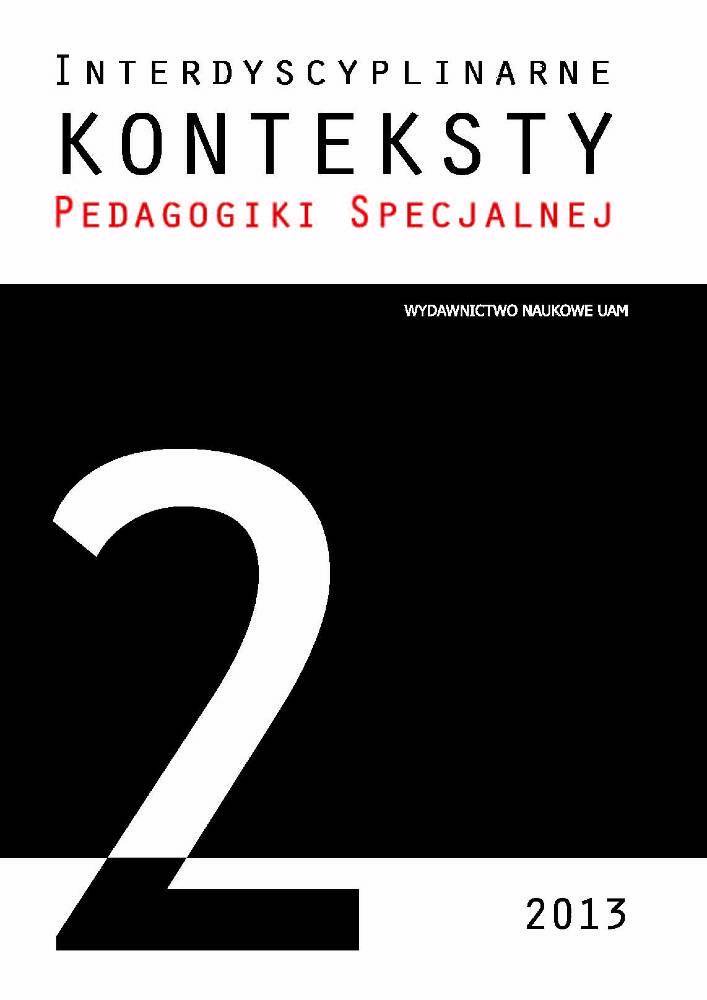Abstract
The author emphasizes the influence of social attitudes towards an individual on his or her self-perception and also pays attention to what threatens the development of identity in people with intellectual disability. It is said that the most important thing in the process of identity formation is the fulfillment of three basic psychological needs during adulthood: the need for having positive relations with other people, the need for autonomy and the need for competence. The limited opportunities of adult women and men with intellectual disability to realize these needs are connected to attitudes towards people with intellectual disability such as over-protectiveness, compassion, focus on deficits, ignorance, segregation, control and judgments. These attitudes are generated by a set of social stereotypes, according to which a person with intellectual disability is an “ageless child”. People with intellectual disabilities are affected by a lack of autonomy, the impossibility of experiencing their own competence as well as limited social contacts as they stay under control of their closest social environment. These problems are concerned with the areas of sexuality and independent living. The author provides examples of discriminatory attitudes as well as current stereotypes and social beliefs which are an actual barrier to the psychosocial functioning of adult people with intellectual disability with respect to the realization of their sexual needs and needs for autonomy.
References
ARNETT J.J., Conceptions of the Transition to Adulthood: Perspectives From Adolescence Through Midlife, „Journal of Adult Development” 2001, Vol. 8, No. 2.
BREARLEY G., Presentation: where did I come from?, Pełnoprawni seksualnie – materiały pokonferencyjne, materiały pokonferencyjne – Stowarzyszenie Na Tak, Poznań 2011.
CHRUŚCIAK M., MICHALCZUK J., SIJKO K., WISZEJKO-WIERZBICKA D., ŻYCZYŃSKA-
-CIOŁEK D., Bariery aktywności zawodowej oraz czynniki sprzyjające podejmowaniu
i utrzymywaniu pracy, [w:] W. Łukowski, Osoby z ograniczoną sprawnością na rynku pracy – portret środowiska, SWPS Academia, Warszawa 2008.
DYKCIK W., Tendencje rozwoju pedagogiki specjalnej. Osiągnięcia naukowe i praktyka (z perspektywy 50-lecia pracy pedagogicznej z osobami z niepełnosprawnością), Wyd. Nauk. Polskiego Towarzystwa Pedagogicznego Oddział w Poznaniu, Poznań 2010.
GOFFMAN E., Piętno. Rozważania o zranionej tożsamości, GWP, Gdańsk 2005.
GOLKA M., Socjologia kultury, Wyd. Nauk. Scholar, Warszawa 2007.
KOŚCIELSKA M., Niechciana seksualność, Jacek Santorski & Co, Warszawa 2004.
PAWELCZAK K., KARWACKA M., Granice społecznego przyzwolenia na realizację praw seksualnych osób z niepełnosprawnością, Impuls, Kraków 2013 [artykuł w druku].
RĘKOSIEWICZ M., W drodze do dorosłości. Tożsamość osób z niepełnosprawnością intelektualną, TIPI, Wielichowo 2012.
WOJCIECHOWSKI F., Problemy adolescencji. Postępowanie profilaktyczne i pomocowe
w kontekście niepełnosprawności, [w:] T. Żółkowska (red.), Społeczno-pedagogiczne konteksty niepełnosprawności, US, Szczecin 2011.
WOŹNIAK Z., Niepełnosprawność i niepełnosprawni w polityce społecznej. Społeczny kontekst medycznego problemu, SWPS Academia, Warszawa 2008.
ZAWIŚLAK A., Jakość życia osób dorosłych z niepełnosprawnością intelektualną, DIFIN, Warszawa 2011.
